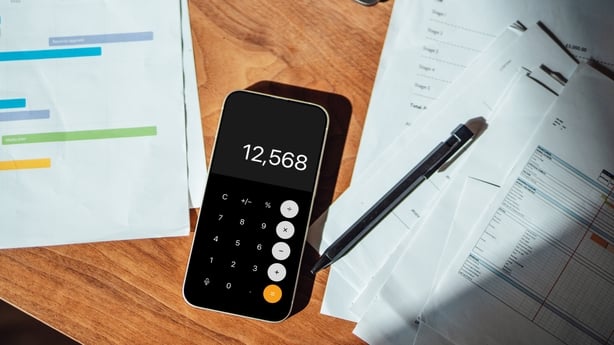The first month of the year and you are probably wondering how to shake the cobwebs off, kick-start your finances and re-energise yourself for what could be the best year of your financial life.
John Lowe of MoneyDoctors.ie sets out the five steps key for the necessary changes to bring you back on track and give you renewed confidence to tackle all the key financial areas in your life to bring you success, happiness and fulfilment.

1. Do a budget plan
It is so important to know how much it costs to run your life on a monthly basis so you can plan. Any surpluses means you can invest towards those goals you wish to achieve, whether that's a ,ain summer holiday, third level education fees, changing your car without having to borrow or next Christmas' costs.
Having a budget deficit means you have three choices:
a. Cut costs
b. Earn more
c. Prioritise
You should also ask yourself the two questions when you have completed your expenditure list:
- Do I need it?
- Is there a better or cheaper alternative?
Write to me for an easy to use, simple to understand budget planner spread sheet – tots itself up and has all the categories. You simply populate all the categories or replace an existing category to maintain the spreadsheet.

2. Savings
We all need to save. During COVID, many of us automatically saved money because we were going out less or not at all, and daily expenditures were reduced. Now many of us are back to our old habits and we need to address savings.
First of all, tot up all the financial costs you know we will have during the year:
- Birthdays, anniversaries, Valentine’s Day, mini-breaks, main holidays, Easter, Christmas, exceptional items (weddings, christenings etc)
- Add up all these costs and divide by 12.
- Now set up a regular saver account (available with all the banks, An Post Money or credit unions) and save between €100 and €1,000 per month into the account – you should only discipline yourself to make ONE withdrawal per annum. The best is AIB Bank and Bank of Ireland both at 2% (1.34% after DIRT tax).
Savings should also include third level costs (regular stock market saver accounts are ideal for these: withdrawal penalties apply in the first five years on a reducing basis – the 5th year it’s 1%). Again ideal for even balloon payments on Personal Contract Plan car loans due after five years. Otherwise the PCP loan is a never ending loan.
You also may need to save for your first home loan – remember you have to have a savings record to show lenders you have ability to repay any prospective mortgage you may wish to take out. And watch those statements - regular bookmaker debits do not impress the lenders!
3. Pensions

We are on a pension time bomb: within 25 years, there is a good chance the government will not have the money to pay out the State Pensions to the 1.8million then pensioners over the age of 66. Last year for every retiree there were four workers. In 2049 there will only be two workers for effectively three times the number of pensioners at that time than there is now.
Ironically the pension is currently the best investment in Ireland. If you are on the 40% tax rate, it means for every €100 invested in your pension, the government gives you €40 back in tax relief. This means you are up 40% before you even start your pension.
Add the average annual growth in the stock market from 1991 to 2020, which was 10.72%, that’s over 50% in total that your fund is up annually. I do not know any other investment that will give you such a good return.
It is never too late or too young to start a pension.
4. Debt management

Many of us can fall into the habit of "maxing out" our credit cards, drawing down the limit to what we can take and then pay only the minimum each month while we catch our breath. The trouble is, the interest is mounting and because we are only paying off the minimum, it will take us years to completely pay off the balance.
Better to transfer the balance to a competitor provider at 0% interest for between six and 12 months. So say you owe €1,200, for many people it is too big an ask to repay in a single month. PTSB, AIB Bank and Bank of Ireland offer a six-month balance transfer at 0% interest rate, so if you can pay €200 per month for those six months, it means your credit card is clear after six months and you have paid no interest for this service.
But paying €200 per month might be a bridge too far for some. Enter An Post Money who offer balance transfer for up to 12 months at 0%, so now it is only €100 per month. You do have to have a good credit history (check with www.centralcreditregister.ie to check your credit history. It's free to receive a report, you just need your name, address and your date of birth. Call them or email them and the report comes up three to four days later).
If you have many loans, you could try the snowball effect: paying off the most expensive debt first and tackling the second most expensive debt, etc.
MABS (Money Advice and Budgeting Services) are an excellent resource if you have serious unsecured debt problems and of course the Insolvency Service of Ireland via www.backontrack.ie. These are Personal Insolvency Practitioners if your debts are secured but you cannot repay.
Whatever you do, sticking your head in the sand will not resolve your issues. There is so much advice, support, and help out there so please avail of it.
5. Fun

Yes, setting targets, budgeting, developing a savings ethic, starting a pension and managing your debts is all very well, but you also need to put some money aside for fun. All work and no play makes Jack and Jill very dull people!
This, though, has to be budgeted too but it is important you include recreational pursuits, hobbies and other fun things to do in your year ahead.
For more information click on John Lowe's profile above or on his website.
The views expressed here are those of the author and do not represent or reflect the views of RTÉ.


